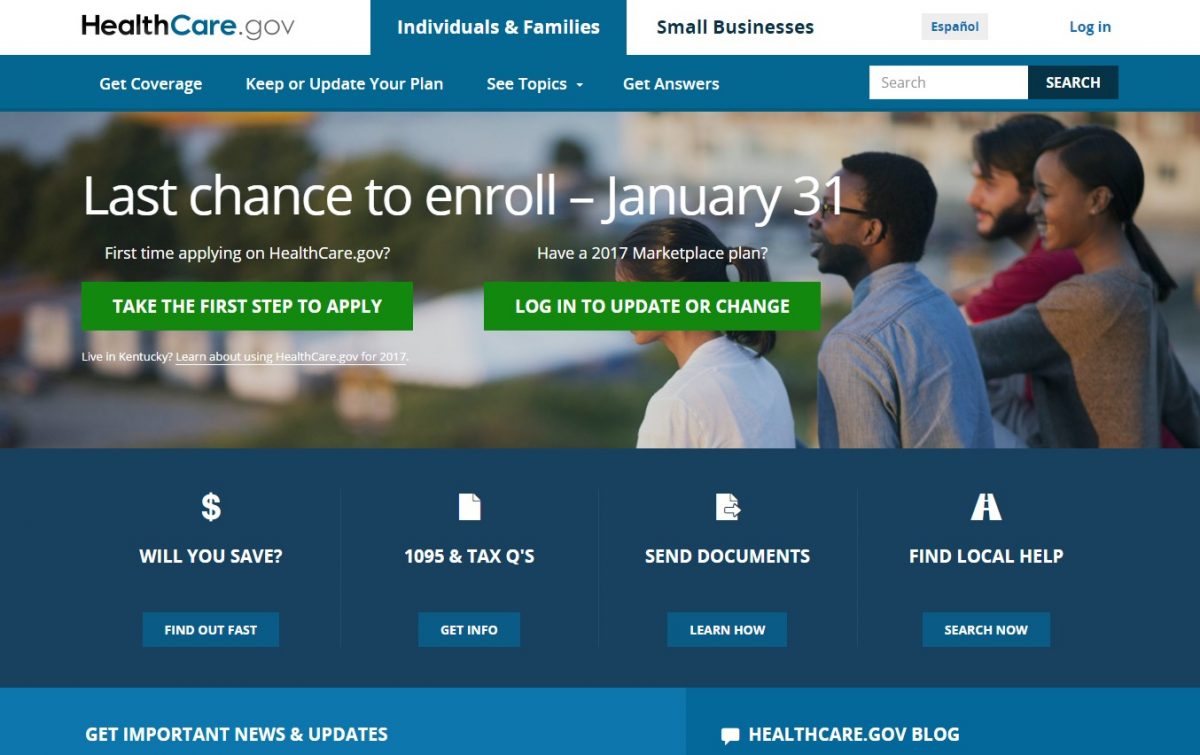Last chance to sign up for Obamacare
Today, January 31, 2017, is the last day of open enrollment for health insurance on the Obamacare exchanges.
For those of us living with a chronic health condition, like diabetes, this is a sad day. Are we hearing the death knell of access to affordable health insurance? We don’t know.
While the new administration has begun the process of repeal with Congress passing a budget resolution and the President signing the Executive Order Minimizing the Economic Burden of the Patient Protection and Affordable Care Act Pending Repeal, it hasn’t presented a clear plan for replacement.
Since Obamacare touches nearly everyone, patients aren’t the only ones concerned about the effects of repeal without a replacement, or as some are framing it “repeal and delay.”
Health insurance companies are saying that repeal and delay will “destabilize the individual insurance market.” Without a replacement in place, they warn that premiums could go up as much as 20% in 2018.
Economists estimate repeal will result in the loss of 3 million jobs. One report goes so far as to say repealing Obamacare will cost the federal government $350 billion over the next decade.
The Republicans have floated a couple of replacement test balloons.
There’s the Cassidy-Collins plan which is most simply described as giving the states three options: keep Obamacare, make their own replacement with some federal subsidy, or opt-out completely not taking any federal funding. This proposal also eliminates “essential health benefits” including hospitalization, pregnancy and maternity care. And while insurers still have to offer coverage to people with pre-existing conditions, they can charge higher premiums if that person had any interruption in health insurance coverage.
The American Healthcare Reform Act of 2017 was introduced to the House and referred to committee on January 4th. Based on work by the Republican Study Committee, this bill would make the cost of health insurance a standard tax deduction for employers and individuals, expand funding for high-risk pools for the states, guarantee coverage for pre-existing conditions as long as there hasn’t been a break in coverage, allow buying health insurance across state lines, reforms medical liability law, and prohibits federal funding of abortion.
Neither of these seems as comprehensive or balanced as Obamacare.
Finally, there’s the A Better Way blueprint for healthcare reform. Looking at the summary of this proposal it seems the most comprehensive. It talks about using a tax credit to make health insurance portable, allowing people to buy health insurance across state lines, enacting medical liability reform, protecting people with pre-existing conditions, allowing dependents to stay on their parent’s insurance up to age 26, and prohibiting sudden cancellations. It also proposes a one-time open enrollment for individuals to get insurance “regardless of how healthy they are.” It proposes to “bring Medicaid into the 21st century” by empowering states “to design Medicaid programs that best meet their needs.” And it would enact the Weldon Amendment giving healthcare professionals “the freedom to exercise their conscience” and enforce the Hyde Amendment keeping “federal tax dollars from being used for abortion or abortion services.” Also in this proposal, there’s a declaration to strengthen funding to the NIH, accelerate development of new drugs, spur the use of electronic health records, and secure the financial future of Medicare.
Last week the Republican retreat took place in Philidelphia. Healthcare was clearly at the top of the agenda for this annual gathering of congressional Republicans. But when all was said and done no clear consensus or direction on repeal and replace/delay emerged. Both the Washington Post and the New York Times reported that rather than unifying on the issue, Republicans agonized over the effects of quickly repealing Obamacare and potential political fallout.
PBS Newshour reported hat the legislative timeline is very loose; the effort “could take them through the summer.” And don’t expect a single, comprehensive bill. Rep. Greg Walden, R-OR, and chair of the House Energy and Commerce Committee, told reporters to not look for a single plan or a single fix.
If that holds true we’re looking at a long road ahead filled with a lot of small, piecemeal bills. I expect the Republicans will try to maintain the popular aspects of Obamacare, like no exclusions for pre-existing conditions. But without a comprehensive approach to healthcare it’s not clear that anyone living with a pre-existing condition will be able to afford health insurance under Trumpcare.
+ + +



Unfortunately, the clear path looks like a backdoor to destroy markets. When those who have access these markets have the option of chasing the lowest price the markets may well collapse. Imagine markets which significantly limit coverage having the lowest prices. These markets will then attract the most healthy people. Limiting coverage will lower premiums. It is unlikely that such insurance will be attractive or even available to those with health issues.
Those markets that offer higher coverages will increasingly be expensive and as they become more expensive they will be less attractive to those with health concerns. Leading inevitably to pre-ACA type coverage.
Markets only work when it is a mix of well and not so well people. Limiting to a single or, a group of states at least, forces a greater mix of the marketplace.